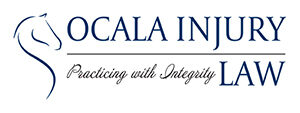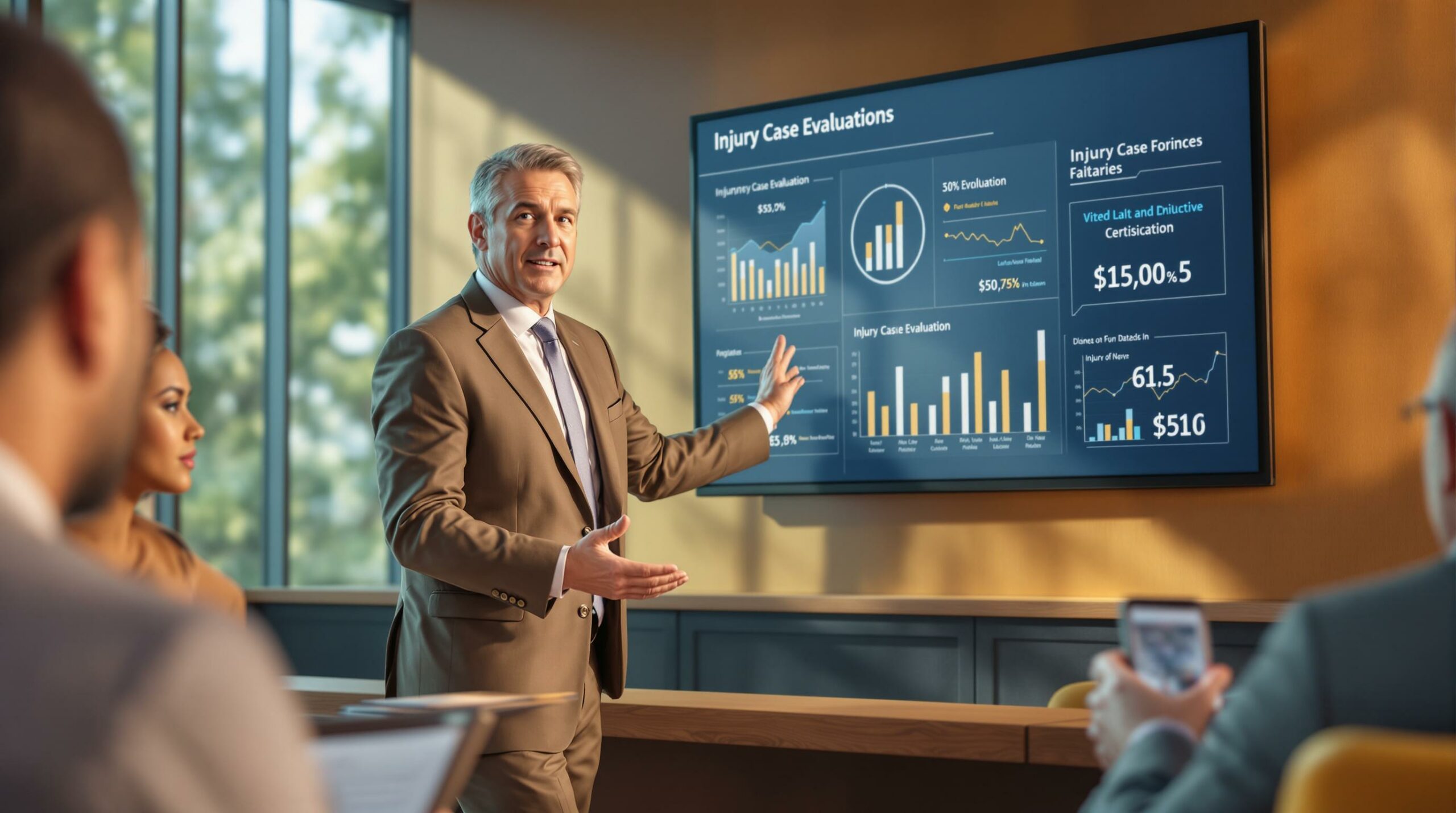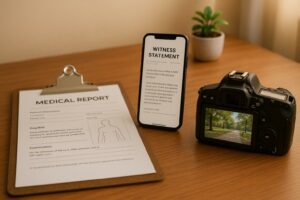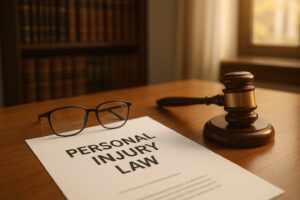Expert witnesses are the backbone of personal injury cases, translating complex medical, financial, and technical details into clear evidence that determines fair compensation. Here’s what they do:
- Medical Experts: Explain injuries, recovery timelines, and long-term health impacts.
- Financial Experts: Calculate current and future economic losses, including medical expenses and lost income.
- Accident Analysts: Reconstruct accidents to determine causes and liability.
Their testimony strengthens claims by proving injury causes, estimating total damages (both economic and non-economic), and supporting settlement negotiations. Choosing the right expert and preparing them thoroughly can make or break a case. Read on to learn how expert witnesses influence outcomes and ensure victims receive fair compensation.
Expert Witness Categories
Expert witnesses provide specialized insights that help clarify the value of a case. Their evaluations play a key role in determining damages, both immediate and long-term.
Medical Specialists
Medical experts include treating doctors, rehabilitation professionals, and specialists like neurologists and orthopedists. They focus on evaluating:
- Current physical limitations and disability levels
- Expected recovery timelines and future treatment costs
- Possible complications
- Effects on daily activities and overall capabilities
These assessments are critical for accurately determining both present and future damages related to injuries.
Financial Analysts
Financial experts assess the economic impact of injuries using detailed calculations. They evaluate:
- Current losses: Medical expenses, lost wages, and other out-of-pocket costs
- Future expenses: Long-term medical care, therapy, and medications
- Lost earning potential: Career setbacks and reduced lifetime earnings
- Household services: Costs for necessary daily assistance
Their analysis accounts for factors like:
- Medical cost inflation
- Career growth trends
- Life expectancy
- Market investment conditions
This data provides solid evidence to support damage calculations and case valuations.
Accident Analysis Experts
Accident reconstruction specialists investigate how injuries occurred, using scientific methods to analyze:
- Scene evidence: Measurements, environmental conditions, and other key details
- Vehicle damage: Patterns of impact and potential mechanical failures
- Computer simulations: Detailed recreations of the accident
- Physics-based calculations: Forces at play and how they caused injuries
Their findings help establish:
- The cause of the accident
- Severity of the impact
- Safety violations or preventable issues
- Responsibility for the incident
These insights are invaluable when building arguments about case value and liability.
Expert Witness Value to Cases
Expert witnesses play a key role in connecting incidents to damages through detailed documentation. They help establish the link between events and the resulting losses.
Proving Injury Causes
Experts rely on various sources, including:
- Medical records and imaging
- Physical evidence
- Treatment documentation
- Patient symptoms
Their analysis helps establish causation by:
- Documenting how injuries align with accident details
- Differentiating new injuries from pre-existing conditions
- Explaining injuries caused by specific forces
- Ruling out alternative causes
Once causation is determined, experts provide precise calculations for both economic and non-economic damages.
Calculating Total Damages
Experts assess current and future losses, breaking them into two key categories:
Economic Damages
- Medical bills
- Lost income
- Rehabilitation expenses
- Necessary out-of-pocket costs
Non-Economic Damages
- Pain and suffering
- Loss of enjoyment of life
- Emotional distress
- Impact of disabilities
They use specialized formulas to project future costs, factoring in medical inflation, life expectancy, wage trends, and ongoing care needs.
Building Strong Evidence
Experts contribute by offering:
Detailed Documentation
- Written reports
- Research-backed findings
- Visual aids for clarity
- Straightforward explanations of complex concepts
Their testimony addresses critical issues such as:
- Defense challenges to claims
- Severity of injuries
- Necessity of treatments
- Disputes over future care needs
Credibility is established through:
- Strong qualifications and experience
- Objective and reliable methods
- Clear, effective communication
- Supporting evidence
This comprehensive approach strengthens settlement negotiations and courtroom presentations, providing a solid foundation for achieving favorable outcomes.
sbb-itb-68ed374
Effects on Case Resolution
Expert testimony plays a key role in shaping both settlement discussions and defense strategies by providing clear, well-supported frameworks for assessing value.
Settlement Negotiations
Expert evidence can significantly strengthen settlement talks by offering:
- Detailed analyses of damages to justify compensation requests
- Documentation of long-term effects on the claimant
- Independent validation of claims to back arguments
This type of evidence often prompts both parties to reconsider their positions.
Defense Response
Expert testimony not only supports settlement arguments but also pushes the defense to adapt its strategies. It does so by:
- Proving the link between injuries and necessary treatments
- Helping ensure damage calculations are precise
- Countering alternative theories with strong, evidence-based rebuttals
Working with Expert Witnesses
Expert witnesses play a key role in assessing case value and making the litigation process more efficient.
Choosing the Right Expert
Finding the right expert witness means focusing on their qualifications. Look for individuals who:
- Hold current board certifications
- Have at least 10 years of professional experience
- Possess a history of providing expert testimony
- Have published peer-reviewed research
- Maintain academic appointments
- Excel in communication
Choosing a well-qualified expert lays the groundwork for effective preparation and strengthens the case.
Preparing the Expert Witness
A carefully selected expert makes preparation much more effective. Here’s how to get them ready:
1. Case Review
Give the expert access to all case-related materials, such as:
- Medical records
- Diagnostic imaging
- Treatment plans and progress notes
- Accident reports and photos
- Witness statements
2. Creating Documentation
The expert should prepare detailed, written reports that:
- Break down technical concepts into simple terms
- Use evidence to back up conclusions
- Provide clear damage calculations
- Anticipate and address opposing arguments
- Reference relevant medical literature
3. Testimony Practice
Schedule practice sessions to help the expert:
- Prepare for cross-examination questions
- Simplify explanations of complex ideas
- Sharpen the presentation of key findings
- Maintain consistent messaging
4. Developing Visual Aids
Create visual materials to support the expert’s testimony, such as:
- Medical illustrations showing injuries
- Timelines of treatment
- Graphs tracking recovery progress
- Anatomical models for demonstrations
These steps ensure the expert witness is well-prepared and impactful, enhancing the case’s overall value.
Conclusion
Expert witness testimony plays a key role in determining accurate values for injury cases. These professionals bring specialized knowledge that directly influences compensation outcomes by providing clear, evidence-based assessments of damages.
Expert witnesses enhance case valuations by:
- Backing injury claims with objective assessments
- Accurately estimating economic and long-term damages
- Supporting settlement negotiations with reliable documentation
At Ocala Injury Law, we collaborate with a network of expert witnesses from medical, financial, and technical fields. We carefully match each case with specialists whose expertise fits the specific circumstances of the injury.
Our approach ensures expert witnesses contribute effectively by:
- Analyzing the severity of injuries through medical evaluations
- Calculating financial losses
- Creating strong documentation to support settlements
- Delivering testimony that simplifies complex details




